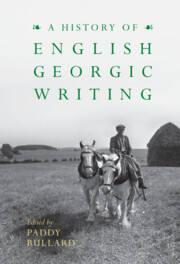Book contents
- A History of English Georgic Writing
- A History of English Georgic Writing
- Copyright page
- Contents
- Contributors
- A Note on National Designations
- Abbreviations
- Introduction
- Part I Turnings
- Part II Times
- Chapter 5 Jacobean Georgic
- Chapter 6 ‘Varieties too Regular for Chance’
- Chapter 7 Enlightenment, Improvement and Experimentation
- Chapter 8 Georgic, Romanticism and Complaint
- Chapter 9 Rural Labour in an Age of Industry
- Chapter 10 Labour Isn’t Working
- Chapter 11 Twentieth-Century Georgic
- Chapter 12 Rags and Tatters
- Part III Territories
- Bibliography
- Index
Chapter 12 - Rags and Tatters
Hughes, Oswald and Their Contemporaries
from Part II - Times
Published online by Cambridge University Press: 01 December 2022
- A History of English Georgic Writing
- A History of English Georgic Writing
- Copyright page
- Contents
- Contributors
- A Note on National Designations
- Abbreviations
- Introduction
- Part I Turnings
- Part II Times
- Chapter 5 Jacobean Georgic
- Chapter 6 ‘Varieties too Regular for Chance’
- Chapter 7 Enlightenment, Improvement and Experimentation
- Chapter 8 Georgic, Romanticism and Complaint
- Chapter 9 Rural Labour in an Age of Industry
- Chapter 10 Labour Isn’t Working
- Chapter 11 Twentieth-Century Georgic
- Chapter 12 Rags and Tatters
- Part III Territories
- Bibliography
- Index
Summary
This chapter provides an account of the georgic in modern and contemporary poetry. It begins by illuminating the georgic qualities, however implicit or accidental, in Ted Hughes’s Moortown Diary, and proceeds to trace the influence of Hughes’s farming poems on the work of his literary contemporaries and successors, including poets such as Geoffrey Hill, Alice Oswald and Sean Borodale. Locating the georgic in the margins and tattered edges of poems – and the working landscapes they describe – it argues that the agricultural and horticultural poetry of these writers represents if not a georgic revival then at least evidence of its survival in the wake of profound changes in agriculture and the British countryside. The particular strain of the georgic that is sustained by these poets is characterised by a documentary style which remains alive to the haphazard circumstances of outdoor work – a style which is as adaptable as it is enduring.
- Type
- Chapter
- Information
- A History of English Georgic Writing , pp. 255 - 272Publisher: Cambridge University PressPrint publication year: 2022

